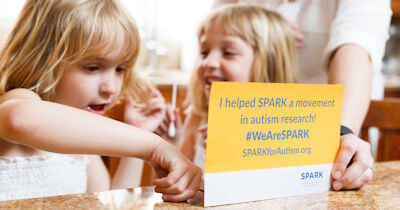Autistics Join SPARK Online Genetic Study
Author: SPARK
Published: 2017/04/04 - Updated: 2021/03/24
Category Topic: Autism Information - Academic Publications
Page Content: Synopsis - Introduction - Main
Synopsis: SPARK, a new genetic study, aims to enroll 50,000 individuals with autism and their families to identify at least 250 genes that contribute to autism. Autism is an umbrella term used to describe a group of complex developmental disorders - autism spectrum disorders - caused by genes or combinations of genes, perhaps in concert with environmental influences.
Introduction
Autism has a strong genetic component. To date, approximately 50 genes have been identified that almost certainly play a role in autism, and researchers estimate that at least an additional 300 are involved. But to identify all the genes at play, many more genetic samples are needed from those with autism and their immediate families.
Main Content
Autism is an umbrella term used to describe a group of complex developmental disorders - autism spectrum disorders - caused by genes or combinations of genes, perhaps in concert with environmental influences. These disorders are characterized by deficits in social communication (both verbal and nonverbal) and the presence of repetitive behaviors or restricted interests. An estimated one in 68 children in the U.S. is on the autism spectrum. The wide range of autism manifestations makes it challenging to study potential causes or treatments, and thus a large cohort that can be segmented - genetically and by the condition's manifestation - can substantially advance such efforts.

SPARK
Simons Foundation Powering Autism Research for Knowledge (SPARK) is an online scientific study and community of individuals with autism and their families. Launched just a year ago, SPARK has already enrolled over 49,500 people from across the country, 19,500 of whom have autism. With 25 clinical site partners around the nation, the study aims to ultimately enroll 50,000 people with autism, plus their families.
SPARK is proud to announce it has expanded the research collaborative this year to include four new sites:
- The Geisinger Clinic of Pennsylvania
- Maine Medical Center
- Medical University of South Carolina
- University of Iowa
SPARK's goals are twofold:
- First, to identify the hundreds of autism genes at play and to link them to the biological mechanisms that they govern as well as to any environmental factors to which participants with autism may have been exposed. Researchers can better understand the condition's causes by linking specific identified genes to the diverse array of symptoms, skills and challenges of those affected.
- Second, it seeks to connect these individuals and families to research opportunities that advance the understanding of autism.
Why Genes? And Why 50,000?
"It is estimated that it will take 50,000 genetic profiles of people with autism to identify a large percentage of the genetic factors contributing to autism," says SPARK principal investigator Dr. Wendy Chung.
"Statistically, if we succeed in working with 50,000 participants on the autism spectrum, we will be able to identify at least 250 genes that contribute to autism that can be used to better understand how the brain is different in individuals with autism and potentially identify targets to develop medications that can be used to support individuals with autism."
In a genetic study of this scope, it is important to collect not only DNA from the person with autism but also that of both of his/her biological parents (a 'trio'). The study currently has almost 20,000 people with autism enrolled but only 12,500 of them are members of trios. Trios enable scientists to identify whether an autism gene was passed down from a parent or 'sprung up' in a different way.
"A major goal of SPARK is to accelerate clinical research in autism by providing easily accessible data and infrastructure to recruit research participants for the autism research community," says Pamela Feliciano, scientific director of SPARK and senior scientist at SFARI, the Simons Foundation Autism Research Initiative.
"We are excited to enable qualified researchers to access SPARK genomic, medical and behavioral data and recruit for their studies through SPARK in a few months."
Through the project's website and on social media, participating individuals and families have begun to express enthusiasm for all that SPARK makes possible:
"As parents we want the best for our children, and being able to understand more about our sons' condition will give us the knowledge to better assist them in becoming the best they can be. We thank SPARK for allowing us to participate in this national research study, and we hope that it will provide important information and create more awareness and acceptance of autism. We encourage families to participate and help spark a better future for all individuals affected by autism." - SPARK participant
Attribution/Source(s): This quality-reviewed publication was selected for publishing by the editors of Disabled World (DW) due to its relevance to the disability community. Originally authored by SPARK and published on 2017/04/04, this content may have been edited for style, clarity, or brevity.